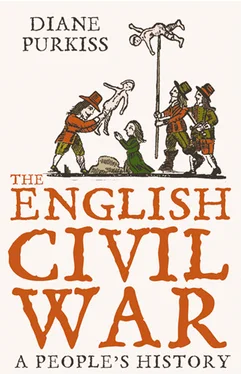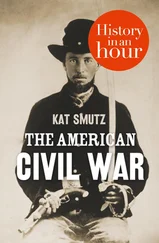Late in 1641 and for the first months of 1642, Protestant Irish refugees flooded into England and Wales, seeking aid from relatives, poor relief, or Parliament. Edmund Ludlow noted that everywhere they went they told stories of the brutalities they had endured, sometimes in a bid to gain relief. Many arrived at Chester and Milford Haven, and more in Lancashire and the Isle of Wight in March 1642 and February 1643 respectively. The earlier refugees were mostly women and children. They told their stories to eager, frightened audiences.
One account given by Richard Baxter summed up the intense propaganda appeal of the Ulster Rising:
This putteth me in mind of that worthy servant of Christ, Dr Teat, who being put to fly suddenly with his wife and children from the fury of the Irish Rebels, in the night without provision, wandered in the snow out of all ways upon the mountain till Mrs Teat, having no suck for the child in her arms, and he being ready to die with Hunger, she went to the brow of a rock to lay him down, and leave him that she might not see him die, and there in the snow out of all ways where no footsteps appeared she found a suck-bottle full of new, sweet milk, which preserved the child’s life.
The helpless women and children, at the mercy of their enemies but cared for by God, were truly iconic for all Protestants in all three kingdoms. If anyone who could read was not afraid of Catholic plots in 1640, a diet of this kind of print ensured that they were terrified by 1642.
Part of the Commons’ efforts to save the kingdom from being engulfed by popery was the prosecution of Strafford, who had come to seem symbolic of the worst aspects of the personal rule. Loathing Strafford was a way of complaining about Charles. Traditionally, grievances about monarchs expressed themselves as dislike of the monarch’s councillors. More importantly, Strafford was the direct enemy of Pym and his supporters. He had tried to get the Commons to impeach them for their correspondence with the Scots Covenanters; now they turned the tables on him.
Pym had thought of Strafford’s trial as an obvious case of treason. But treason had to be a crime against the king. It was widely known that Charles had trusted Strafford completely and was still refusing to get rid of him or to back away from his policies. So Pym said that Strafford was guilty of treason not against the king, but against the constitution. Here again, Pym seems to have reversed accidentally into radicalism because of expediency. Strafford sensibly pointed out what a dangerous idea this was, but by then he was so hated that the London crowd simply wanted him dead, and was not over-particular about the means. The case began with Pym’s sizzling attack on Strafford’s activities in Ireland, another Pym theme. But things didn’t quite go to plan. At his trial, Strafford remained brave and calm, and even those who loathed him were moved to grudging admiration. His worst crime, which was to have said that an Irish army might be brought over to reduce Scotland and then England, was poorly evidenced – only Henry Vane the Elder could be got to say that he had heard Strafford actually say it, and the law required two witnesses. Nonetheless, Strafford’s indictment allowed the Commons to practise talking as if they and not the king embodied English sovereignty. It was to become an acceptable rather than an unthinkable idea.
Now it was another MP, godly Arthur Haselrig, who had a clever new notion, though not one congenial to Pym, who was hoping for a show-trial. Why not drop the cumbersome impeachment, which actually required tiresome amounts of proof? Why not simply introduce a Bill of Attainder? All this required was a Commons vote. At first Pym was against it, but came around to the idea once he saw that it was the only sure-fire way to bring Strafford to the scaffold. Strafford’s final speech in his own defence, made on 13 April, was a gallant attempt to rebut the charges in the name of the very traditions the king had violated: ‘I have ever admired the wisdom of our ancestry, who have so fixed the pillars of this monarchy that each of them keeps their measure and proportion with each other … the happiness of a Kingdom consists in this just poise of the king’s prerogative and the subject’s liberty and that things should never be well till these went hand in hand together.’
It was Pym who stood up to refute Strafford, and he said that ‘if the prerogative of the king overwhelm the liberty of the people, it will be turned into tyranny; if liberty undermine the prerogative, it will grow into anarchy’. This scarcely answered Strafford’s charge that laws could not be set aside. Prophetically, he argued that ‘You, your estates, your posterities lie all at the stake if such learned gentlemen as these, whose lungs are well acquainted with such proceedings, shall be started out against you: if your friends, your counsel were denied access to you, if your professed enemies admitted to witness against you, if every word, intention, circumstance of yours be alleged as treasonable, not because of a statute, but a consequence, a construction of law heaved up in a high rhetorical strain, and a number of supposed probabilities’.
Thanks to this powerful appeal, fifty-nine people voted against the Bill of Attainder at its third reading, and found their names on a list posted outside the Commons, headed, ‘These are the Straffordians, the betrayers of their country.’ Things were turning nasty.
The same mood prevailed in the streets, and newer and more radical voices emerged from the hubbub. Rude Henry Marten, certainly no Puritan, was among those who produced the Protestation, which was an imitation of the Kirk’s Covenant, and toughly vowed to crush all who threatened true religion, especially priests and Jesuits, ‘and other adherents of the See of Rome [that] have of late more boldly and frequently put in practice than formerly’. It did offer allegiance to the king as well, but like Pym, Marten had come to think the king was the problem in guaranteeing true religion. As early as 1641 Marten confessed to his friend Sir Edward Hyde that he did not believe that one man was wise enough to rule a whole nation. By 1642 he was identified as a key figure among those Sir Simonds D’Ewes referred to as the ‘fiery spirits’ who used language disparaging towards the royal dignity. Having proclaimed kingship to be forfeitable he was excluded from pardon for life or estate by Charles I in the same year. Later he was to go further. In support of the Puritan divine John Saltmarsh, the author of a pamphlet proposing the deposition of the king, Marten stated in the Commons on 16 August 1643 that ‘it were better one family be destroyed than many’. He was asked who he meant, and at once said he meant the royal family. For this the Commons sent him to the Tower; they were not yet ready to hear what he had to say.
In the meantime, a group of writers had vowed to free Strafford; borrowing a none-too-plausible plot from the stage, they planned to seize the Tower and help Strafford to make his getaway, while bringing the army south. The group included William Davenant, who had long claimed to be Shakespeare’s illegitimate son, and the elegant and intelligent Sir John Suckling. Also involved was George Goring, later a Royalist general of notoriously undisciplined troops and himself a wild card. Charles, who always loved a play, was privy to their counsels, but may also have urged Goring to leak it to the Parliamentarian leadership. He was attempting to convince them not to pursue Strafford to death, trying to frighten them off. It didn’t work. The Lords passed the attainder by a slim margin, with many bishops and all the Catholic peers missing. An armed mob accompanied those taking it to the king for signature.
And the next day, on Sunday 9 May 1641, after hesitating all evening, Charles signed his chief counsellor’s death warrant. He did it to save his wife, who would certainly have been next, and his frightened children. But he never forgave himself. Strafford was to face the executioner’s axe on 12 May 1641, before a huge and joyous crowd. ‘I do freely forgive all the world,’ he said on the scaffold, ‘I wish that every man would lay his hand on his heart and consider seriously whether the beginnings of the people’s happiness should be written in letters of blood.’ But London was glad to have it so, and as Strafford’s bloody head was lifted, bonfires flamed across the country, and at dusk candles were lit in windows to celebrate his fall.
Читать дальше












